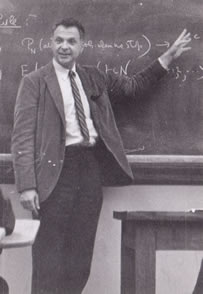This article includes a list of general references, but it lacks sufficient corresponding inline citations. (May 2022) |
Herbert Ellis Robbins | |
|---|---|
 Herbert Robbins visiting Purdue in 1966 | |
| Born | January 12, 1915 New Castle, Pennsylvania, US |
| Died | February 12, 2001 (aged 86) Princeton, New Jersey, US |
| Alma mater | Harvard University |
| Scientific career | |
| Institutions | |
| Thesis | On the Classification of the Maps of a 2-Complex into a Space (1938) |
| Doctoral advisor | Hassler Whitney |
| Doctoral students | |
Herbert Ellis Robbins (January 12, 1915 – February 12, 2001) was an American mathematician and statistician. He did research in topology, measure theory, statistics, and a variety of other fields.
He was the co-author, with Richard Courant, of What is Mathematics?. The Robbins lemma, used in empirical Bayes methods, is named after him. Robbins algebras are named after him because of a conjecture (since proved) that he posed concerning Boolean algebras. The Robbins theorem, in graph theory, is also named after him, as is the Whitney–Robbins synthesis, a tool he introduced to prove this theorem. The well-known unsolved problem of minimizing in sequential selection the expected rank of the selected item under full information, sometimes referred to as the fourth secretary problem, also bears his name: Robbins' problem (of optimal stopping).